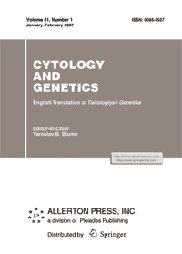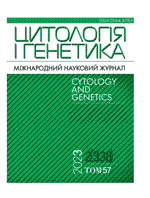In colorectal cancer (CRC), inactivation of SMAD4 occurs early in the disease development and SMAD4 represents one of key driver genes in progression and metastasis. Loss of SMAD4 protein expression is a relatively common feature of sporadic colorectal cancers, and it was observed to be even more frequent in tumors of patients with early onset disease and also more frequent in microsatellite stable tumors. Pathogenic variants in the SMAD4 gene are usually missense or nonsense mutations, and they are more frequent in the Cterminal domain. The aim of this study was to perform genetic analysis of SMAD4 Cterminal domain in colorectal cancer patients with early onset disease and microsatellite stable tumors. This pilot study was conducted with a purpose of investigating if such genetic screening strategy would be useful for diagnostic purposes in this specific subgroup of CRC patients. The study was conducted in a selected set of DNA samples extracted from the tumors of CRC patients who had less than 50 years at the time of diagnosis. Genetic analysis of Cterminal domain has encompassed analysis of exons 9, 10, 11 and 12 of the SMAD4 gene by PCR and direct DNA sequencing. Among the twenty analyzed tumor DNAs, one sample was found to harbor a SMAD4 variant: NC_000018.9:g.48591918C>T; (NM_005359.5: c.1081C>T; Arg361Cys). The variant was discovered in exon 9, affecting the codon 361, which represents a mutational hot spot within the SMAD4 gene. This variant was discovered in homozygous state in the tumor of a 47years old female with T3 stage carcinoma of the right colon. Considering the incidence and functional consequences of SMAD4 exon 9 variants, the screening of this region could be a useful low cost strategy for the genetic analysis of colorectal tumors from patients with early onset disease, as well as for susceptibility testing.
Keywords: colorectal cancer, early onset disease, genetic testing, pathogenic variant, SMAD4

Full text and supplemented materials
References
Bessa, X., Alenda, C., and Paya, A., et al., Validation microsatellite path score in a population-based cohort of patients with colorectal cancer, J. Clin. Oncol., 2011, vol. 29, no. 25, pp. 3374–3380. https://doi.org/10.1200/JCO.2010.34.3947
Bonfiglio, S., Vanni, I., Rossella, V., et al., Performance comparison of two commercial human whole-exome capture systems on formalin-fixed paraffin-embedded lung adenocarcinoma samples, BMC Cancer, 2016, vol. 16, art. ID 692. https://doi.org/10.1186/s12885-016-2720-4
Chang, Y.C., Chang, J.G., Liu, T.C., et al., Mutation analysis of 13 driver genes of colorectal cancer-related pathways in Taiwanese patients, World J. Gastroenterol., 2016, vol. 22, no. 7, pp. 2314–2325. https://doi.org/10.3748/wjg.v22.i7.2314
De Bosscher, K., Hill, C.S., and Nicolás, F.J., Molecular and functional consequences of Smad4 C-terminal missense mutations in colorectal tumour cells, Biochem. J., 2004, vol. 379, pp. 209–216. https://doi.org/10.1042/BJ20031886
Gallione, C.J., Repetto, G.M., Legius, E., et al., A combined syndrome of juvenile polyposis and hereditary haemorrhagic telangiectasia associated with mutations in MADH4 (SMAD4), Lancet, 2004, vol. 363, pp. 852–859. https://doi.org/10.1016/S0140-6736(04)15732-2
Gallione, C.J., Richards, J.A., Letteboer, T.G., et al., SMAD4 mutations found in unselected HHT patients, J. Med. Genet., 2006, vol. 43, no. 10, pp. 793–797. https://doi.org/10.1136/jmg.2006.041517
Houlston, R., Bevan, S., Williams, A., et al., Mutations in DPC4 (SMAD4) cause juvenile polyposis syndrome, but only account for a minority of cases, Hum. Mol. Genet., 1998, vol. 7, no. 12, pp. 1907–1912. https://doi.org/10.1093/hmg/7.12.1907
Howe, J.R., Sayed, M.G., Ahmed, A.F., et al., The prevalence of MADH4 and BMPR1A mutations in juvenile polyposis and absence of BMPR2, BMPR1B, and ACVR1 mutations, J. Med. Genet., 2004, vol. 41, pp. 484–491. https://doi.org/10.1136/jmg.2004.018598
Huang, D., Sun, W., Zhou, Y., et al., Mutations of key driver genes in colorectal cancer progression and metastasis, Cancer Metastasis Rev., 2018, vol. 37, pp. 173–187. https://doi.org/10.1007/s10555-017-9726-5
McCarthy, A.J. and Chetty, R., Smad4/DPC4, J. Clin. Pathol., 2018, vol. 71, pp. 661–664. https://doi.org/10.1136/jclinpath-2018-205095
Miyaki, M. and Kuroki, T., Role of Smad4 (DPC4) inactivation in human cancer, Biochem. Biophys. Res. Commun., 2003, vol. 306, no. 4, pp. 799–804. https://doi.org/10.1016/s0006-291x(03)01066-0
Nikolic, A., Kojic, S., Knezevic, S., et al., Structural and functional analysis of SMAD4 gene promoter in malignant pancreatic and colorectal tissues: Detection of two novel polymorphic nucleotide repeats, Cancer Epidemiol., 2011, vol. 35, no. 3, pp. 265–271. https://doi.org/10.1016/j.canep.2010.10.002
Perea, J., García-Nebreda, M., Hidalgo, M., et al., SMAD4 in early onset colorectal cancer, Colorectal. Dis., 2010, vol. 12, art. ID 948. https://doi.org/10.1111/j.1463-1318.2010.02296.x
Royce, S.G., Alsop, K., Haydon, A., et al., The role of SMAD4 in early-onset colorectal cancer, Colorectal Dis., 2010, vol. 12, no. 3, pp. 213–219. https://doi.org/10.1111/j.1463-1318.2009.01779.x
Schwenter, F., Faughnan, M.E., Gradinger, A.B., et al., Juvenile polyposis, hereditary hemorrhagic telangiectasia, and early onset colorectal cancer in patients with SMAD4 mutation, J. Gastroenterol., 2012, vol. 47, pp. 795–804. https://doi.org/10.1007/s00535-012-0545-8
Shi, Y., Hata, A., Lo, R.S., et al., A structural basis for mutational inactivation of the tumour suppressor Smad4, Nature, 1997, vol. 388, pp. 87–93. https://doi.org/10.1038/40431
Venook, A.P., Right-sided vs left-sided colorectal cancer, Clin. Adv. Hematol. Oncol., 2017, vol. 15, pp. 22–24.
Yang, G. and Yang, X., Smad4-mediated TGF-β signaling in tumorigenesis, Int. J. Biol. Sci., 2010, vol. 6, no. 1, pp. 1–8. https://doi.org/10.7150/ijbs.6.1
Zhao, M., Mishra, L., and Deng, C.X., The role of TGF-β/SMAD4 signaling in cancer, Int. J. Biol. Sci., 2018, vol. 14, pp. 111–123. https://doi.org/10.7150/ijbs.23230
